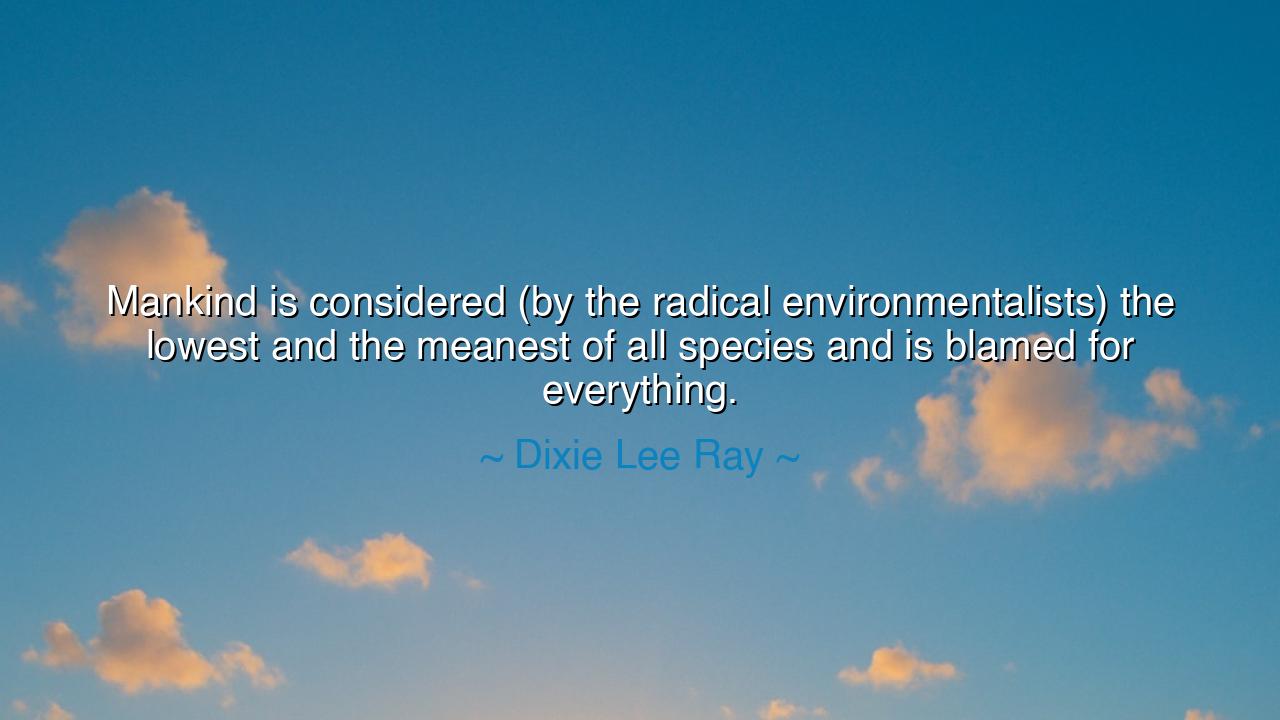
Mankind is considered (by the radical environmentalists) the
Mankind is considered (by the radical environmentalists) the lowest and the meanest of all species and is blamed for everything.






In the words of Dixie Lee Ray, there lies a spark of defiance and sorrow—a lament born of the tension between mankind and nature, between creation and condemnation. “Mankind is considered (by the radical environmentalists) the lowest and the meanest of all species and is blamed for everything.” This saying, though shaped in the fires of modern conflict, speaks to an eternal struggle: the war between guilt and guardianship, between man’s destructive hand and his divine capacity to create. It reminds us that to understand our place in the world, we must neither idolize ourselves nor despise our kind, but rather find harmony within the great web of existence.
In ages past, the wise men of every civilization knew that balance was sacred. They bowed before the forests and the seas, not as slaves, but as stewards. Yet in the age of industry, mankind’s hand grew heavy—machines thundered, rivers darkened, and the skies filled with smoke. In this, some found reason to blame mankind, to see in him only corruption and ruin. But others, like Dixie Lee Ray, saw danger in this despairing creed—a belief that man himself is a plague upon the earth, unworthy of his dominion. Such a view, she warns, blinds us to our power for good, for restoration, for responsibility. For though mankind has erred, he is also the only creature who can reflect, repent, and rebuild.
Remember the tale of Prometheus, who stole fire from the gods to bring light to humankind. For his act of defiance, he was chained to a rock, his liver devoured by the vulture of vengeance. But without his flame, mankind would have remained in darkness. So too, we must recognize that our fire—the spark of innovation, the hunger to shape the world—carries both blessing and curse. To condemn mankind entirely is to forget that even the gods trembled at his potential. It is not fire itself that destroys, but the hand that wields it without wisdom.
There was once a time when the world despaired of its own survival. The seas were poisoned, the air was thick with soot, and the cry of dying creatures echoed across the land. Yet from that darkness rose men and women of courage—scientists, farmers, inventors—who sought not to curse humanity, but to change it. The birth of environmental science, the restoration of forests, the cleansing of rivers—all these were born not from hatred of mankind, but from his capacity to learn and atone. And in this lies the truth of Dixie Lee Ray’s words: that we must beware of those who seek redemption through self-loathing, for no seed of healing grows from despair.
To believe that mankind is the lowest and meanest is to strip him of his duty and his hope. It is to turn the heart from stewardship to shame. Yet the ancient teachers would remind us: every creature in the cosmos has purpose, and man’s is to understand and protect. The earth does not ask us to vanish—it asks us to awaken. For we are neither gods nor vermin; we are the bridge between heaven and soil, the voice through which the universe contemplates itself.
So let us not fall into the silence of guilt, nor the arrogance of domination. Let us walk instead the narrow path of reverent strength—to act as caretakers, not conquerors; as creators, not destroyers. When we plant a tree, when we teach a child to wonder, when we choose wisdom over waste, we reclaim our honor in the eyes of the world. The ancients would say: “The land gives itself to those who listen.” So too must we listen—to the earth, to reason, and to the better angels within our own species.
And this is the final lesson, O seeker of truth: Do not despise mankind, for to despise him is to despair of his salvation. Instead, believe in his power to rise, to evolve, to renew. Let our generation be remembered not as the destroyers, but as the restorers—the ones who took responsibility, who healed what was broken, who turned condemnation into creation. For it is not blame that will save the world, but understanding, not hatred but hope, not despair but action.






AAdministratorAdministrator
Welcome, honored guests. Please leave a comment, we will respond soon